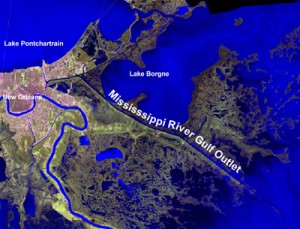Jennifer M. Klein, Esq.
Associate Director & Fellow
 Flooding from Hurricane Katrina constitutes a taking of property without just compensation by the United States government, according to a recent decision from the United States Court of Federal Claims in Saint Bernard Parish Government, et al., v. The United States. Judge Susan Braden found that the Army Corps of Engineers’ (the Corps) negligent design and failure to maintain the Mississippi River Gulf Outlet (MR-GO), a canal constructed by the Corps in the 1950s, exacerbated flood damage in parts of New Orleans. The increased flooding, although temporary, wrongfully deprived land owners of the use of their property. Judge Braden’s decision relied heavily on a 2012 Supreme Court case, Arkansas Game and Fish Commission v. United States, which held that temporary flooding caused by government action is not categorically exempt from Takings Clause liability.
Flooding from Hurricane Katrina constitutes a taking of property without just compensation by the United States government, according to a recent decision from the United States Court of Federal Claims in Saint Bernard Parish Government, et al., v. The United States. Judge Susan Braden found that the Army Corps of Engineers’ (the Corps) negligent design and failure to maintain the Mississippi River Gulf Outlet (MR-GO), a canal constructed by the Corps in the 1950s, exacerbated flood damage in parts of New Orleans. The increased flooding, although temporary, wrongfully deprived land owners of the use of their property. Judge Braden’s decision relied heavily on a 2012 Supreme Court case, Arkansas Game and Fish Commission v. United States, which held that temporary flooding caused by government action is not categorically exempt from Takings Clause liability.
Prior efforts to hold the government liable for flood damage from Hurricane Katrina were unsuccessful. An earlier case brought claims under the Federal Tort Claims Act (FTCA), rather than the Takings Clause of the United States Constitution. In that case, the Fifth Circuit Court of Appeals at first affirmed the trial court’s finding of liability, but then issued a subsequent ruling finding that the government was immune from the plaintiffs’ claims, because its actions in connection with the design and maintenance of MR-GO were largely discretionary. In contrast, the United States has waived sovereign immunity for claims brought under the Takings Claims through the Tucker Act, which grants jurisdiction to the Court of Federal Claims for claims for “damages in cases not sounding in tort.”
Some legal scholars, including John Echeverria of Vermont Law School, have expressed concern that Saint Bernard Parish and Arkansas Game and Fish Commission allow the takings doctrine to improperly invade the traditional domain of tort law. The apparent expansion of takings liability ushered in by these cases, however, will likely be tempered by the fact specific analysis required in cases asserting claims for temporary takings due to flooding. As Judge Braden explained, a plaintiff asserting a claim for a temporary taking must establish: (1) a protectable property interest under state law; (2) the character of the property and the owners’ “reasonable-investment backed expectations”; (3) foreseeability; (4) causation; and (5) substantiality. Moreover, the question remains whether liability exists only where the government negligently designs and maintains infrastructure, or whether it is possible to hold the government accountable where it decides not to build at all despite known risks.
The finding in Saint Bernard Parish that the government is liable for inadequately preparing federally-constructed and maintained infrastructure for severe weather events is significant in light of the increasing risk of such events due to climate change. Notably, Saint Bernard Parish, if it survives appeal, expands government liability from situations in which the government deliberately causes flooding, for example by releasing water from a dam, to include situations in which inaction by the government exacerbates flooding from severe weather. This developing area of law will also have broad implications for local and state governments seeking to prepare for – or deliberately deciding not to prepare for – climate change impacts.


